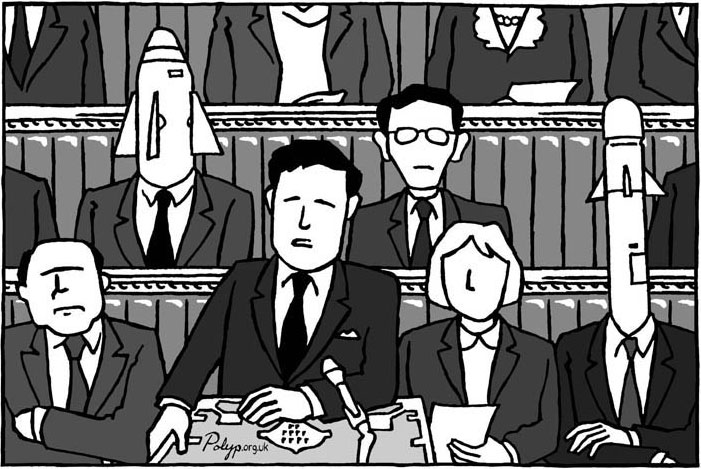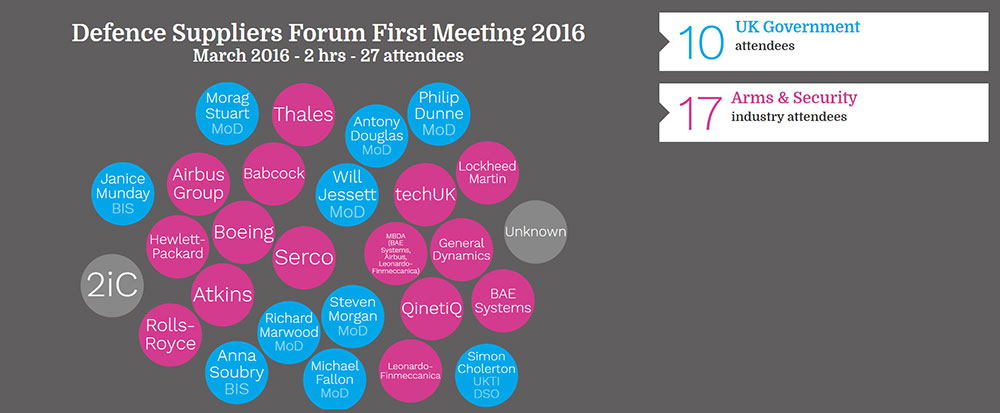The political influence of the arms trade is insidious and can be observed at every level of government.
UK Defence and Security Exports
Perhaps the most blatant way in which the arms industry has a direct foothold in government is the existence of a dedicated arms exports promotion unit – UK Defence and Security Exports – previously known as the Defence and Security Organisation (DSO), within the Department for International Trade (DIT). It is at the heart of the government’s support for the arms trade.
It exists to help arms companies sell weapons to other countries, promoting weapons sales to repressive regimes and countries in conflict, with little or no regard for the impact of the sales.
Its role is neatly summed up by its meetings. There are large numbers with the major arms and security companies and also across the relevant government departments – from the Ministry of Defence to the Prime Minister’s Office. It is effectively a trade association within government, coordinating Whitehall in support of arms sales for international companies.
High level advisory bodies
A further channel of arms industry influence within government is through a web of advisory bodies
, steering groups
, teams
, partnerships
etc., the executives of arms companies enjoy privileged access to senior decision-makers, which appears to go beyond that of any other sector.
Two bodies operate at the highest level: the Defence Suppliers Forum and Defence Growth Partnership. These groups bring together ministers and the chief executives of arms companies to formulate policy on a range of issues, from domestic investment in the industry to selling weapons overseas.
There is a web of further bodies focused on specific sectors or equipment, also facilitating arms company executives’ privileged access to senior decision-makers. Minutes reveal that several of these groups are focused on exporting specific types of weaponry. Information is known about groups focusing on exports of warships and aircraft, as well as cyber technology. Even these mid-level groups are tasked with representing arms industry interests at a ministerial level, and even to the Treasury.
There is little information about the mid-level groups in the public domain. Almost all the information has been obtained through Freedom of Information (FoI) requests.
Defence Suppliers Forum
The Defence Suppliers Forum, the major conduit for MoD-industry relationships
, consists of the Chief Executives of major international arms companies, government ministers, and senior civil servants. It is chaired by the Defence Secretary and includes two other Ministers.
In 2013-14 its Exports sub-group was co-chaired by Richard Paniguian, then head of the government’s arms sales unit, and BAE’s Alan Garwood. The group called itself a provider of advice
to the Government, taking forward exportability, through life support, and the emerging exports agenda… to advance support for exports
(Exports sub group meeting, March 2013). Other arms companies known to have been at these meetings include General Dynamics, Rolls-Royce, Selex, and Thales.
Read the minutes online
Defence Growth Partnership
Officially launched at the DSEI arms fair in September 2013, the Defence Growth Partnership (DGP) is another top-level partnership giving arms company executives access to Ministers. It is co-chaired by a Business Minister and Steve Wadey, Managing Director of missile company MBDA. Philip Dunne, a Minister in the MoD, also attends the meetings.
The Defence Growth Partnership’s launch report laid out a strategic vision
for the arms industry in the UK. It says it aims to maximise the opportunities for British business
(Defence Growth Partnership launch report, p.1). There are 15 major arms companies currently involved. Most of them are huge multinationals, and half are headquartered overseas. The companies are: Babcock, BAE, Cobham, EADS, Finmeccanica (now Leonardo), General Dynamics, Hewlett-Packard, Lockheed Martin, Marshall, MBDA, QinetiQ, Raytheon, Rolls-Royce, Serco and Thales.
Formal meetings of the Defence Growth Partnership began in July 2013. However, documents obtained through FoI reveal the two chairs met for the first time in January 2013. At that meeting, MBDA’s Steve Wadey proposed the following vision statement
: X% growth of the Defence Sector contribution to the UK economy by 2030
, and it was decided to spend the first 3-6 months determining what figure should be inserted at X
.
As a first step
, Wadey threw a dinner for other arms company executives to start to agree the contribution, orientation and membership of DGP
later that month.
Sector-specific bodies
Apart from these two main bodies, there is a long list of sector-specific or equipment-specific bodies. There is very little information in the public domain about these groups; what is known has been obtained through Freedom of Information requests.




